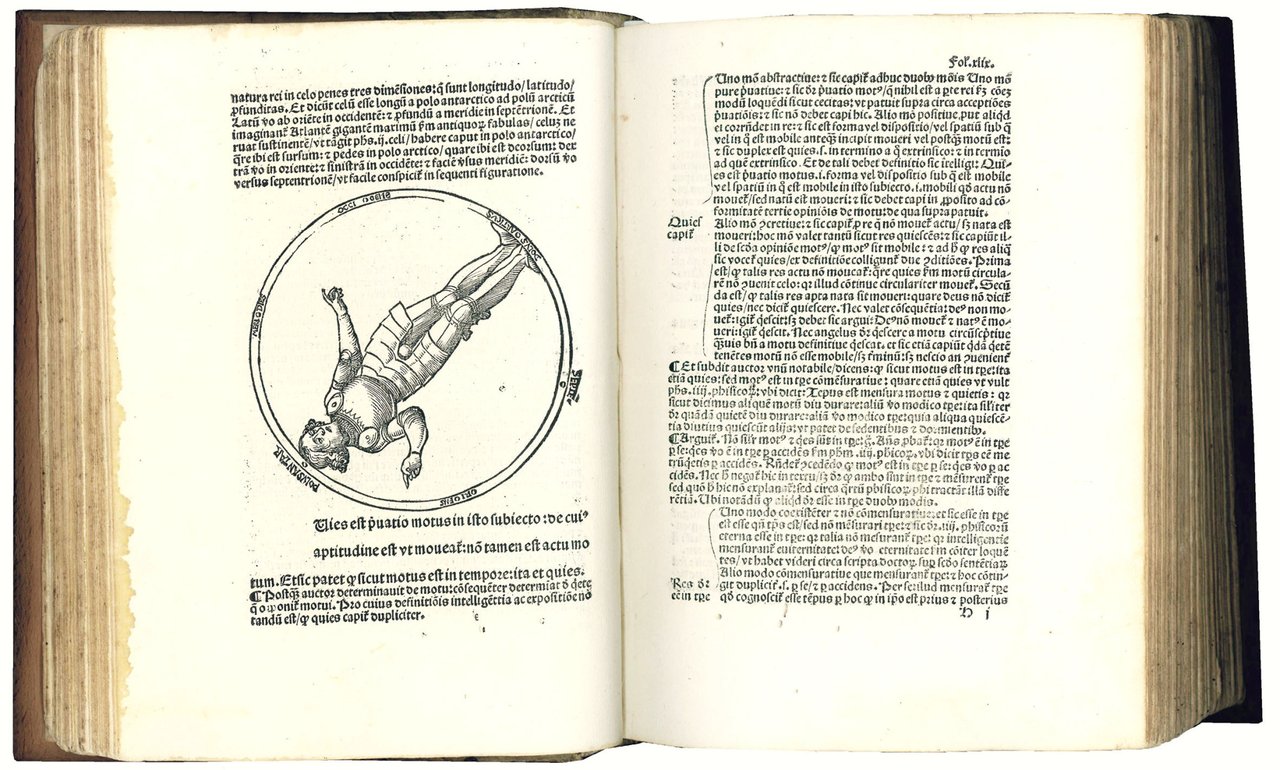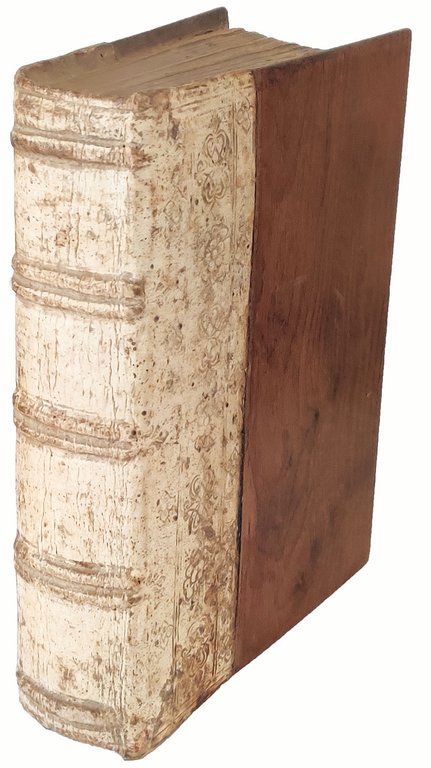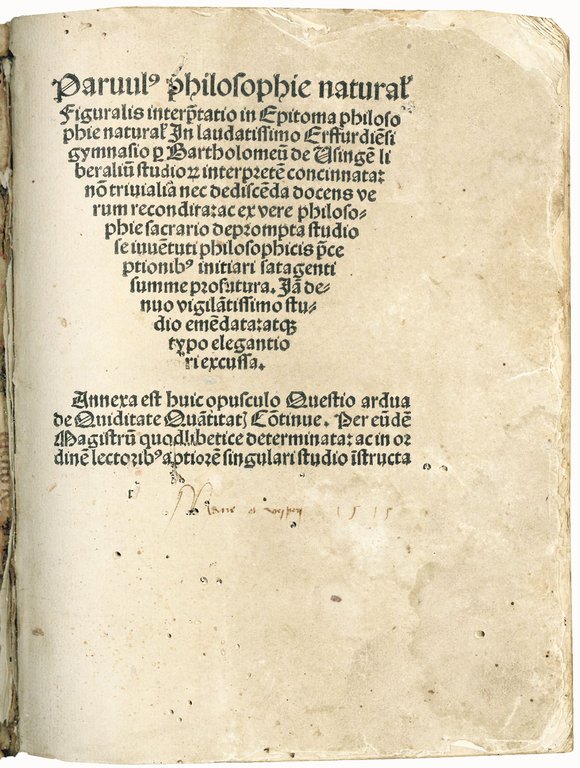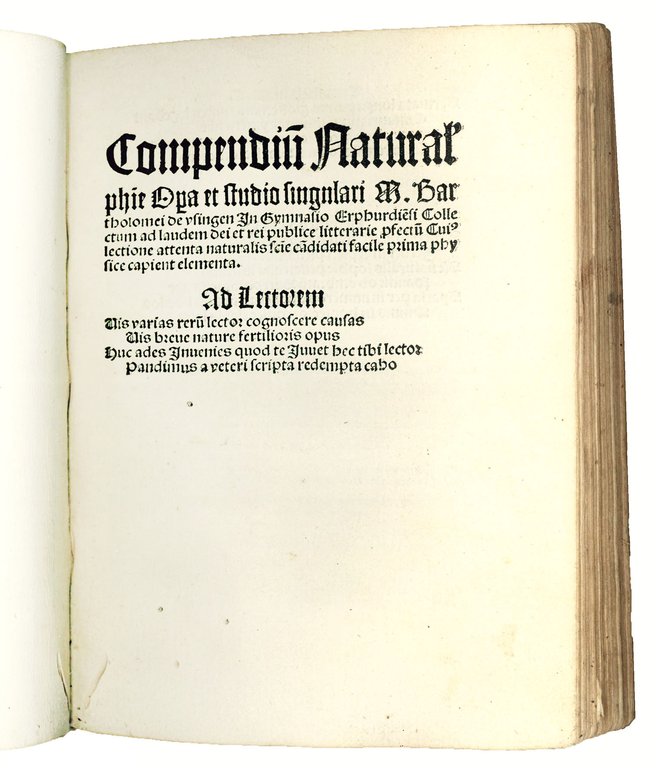Parvulus philosophiae naturalis Figuralis interpretatio in Epitoma philosophiae naturalis in laudatissimo Erffurdiensi gymnasio per Barth. de Usingen liberalium studiorum concinnata [...] Annexa est huic opuscolo Quaestio ardua de Quiditate quantitatis continuae
Parvulus philosophiae naturalis Figuralis interpretatio in Epitoma philosophiae naturalis in laudatissimo Erffurdiensi gymnasio per Barth. de Usingen liberalium studiorum concinnata [...] Annexa est huic opuscolo Quaestio ardua de Quiditate quantitatis continuae
Mode de Paiement
- PayPal
- Carte bancaire
- Virement bancaire
- Pubblica amministrazione
- Carta del Docente
Détails
- Année
- 4 December 1511
- Lieu d'édition
- Basel
- Auteur
- ARNOLDI DE USINGEN, Bartholomaeus (1465-1532)
- Éditeurs
- Jakob Wolff de Pfortzheim
- Thème
- Quattro-Cinquecento
- Etat de conservation
- En mauvais état
- Langues
- Italien
- Reliure
- Couverture rigide
- Condition
- Ancien
Description
ONE OF LUTHER'S TEACHERS IN PHILOSOPHY AT ERFURT
[Bound with] EIUSDEM. Compendium Naturalis philosophiae Opera et studio singulari M. Bartholomei de Usingen In Gymnasio Erphurdiensi Collectam ad laudem Dei et ei publicae litterariae [...] Erfurt, Wolfgang Schenck, [1507].
Two works in one volume, 4to (209x153 mm.). CXL [i.e. 130], [1 blank]; [74] ll. Collation: A8 B-C6 D4 E-G8 H12(-1) I6 K-S8 T4; A4 B6 C4 D6 E4 F6 G-H4 J6 K4 Z4 A6 A4 D6 P6 (l. P6 blank). In the first work the l. H12 is not present as in all copies. With a large woodcut on the l. XLVIIIv. The title epigram in the second work is assigned to “E.H.” (probably Eobanus Hessus) at the l. A1v. Contemporary half blind-tooled pig skin over wooden boards (binding slightly rubbed, round worm holes to the back panel, traces of clasps). On the first title page contemporary ownership entry ‘Mann er […] 1515', in the final index of the first work page numbering added by a contemporary or slightly later hand. With some marginal manuscript annotations. Several worm holes and tracks at the beginning and at the end of the volume, some occasional light browning and staining, first title page soiled, upper margin of the first two leaves frayed, all in all a good copy.
Rare third edition (first: Leipzig 1499; second: Cracow 1507) of the Parvulus philosophie naturalis and first edition of the Compendium naturalis philosophiae. Both works are commentaries on Peter of Dresden's (Peter Gerticz) treatise Parvulus philosophiae naturalis, often used as teaching material in the Erfurt schools since the end of the 14th century. Arnoldi's compendia are intended to introduce students into the application of the scholastic nominalistic criteria. It dealsa in particular with the topic of the sensation and perception as exposed in Aristotle's De anima.
The Parvulus philosophiae naturalis is a concise compendium, containing overall 56 Quaestiones, each one beginning with ‘Utrum', divided into two groups. At the end is furthermore printed the text of a quodlibet disputation which took place at Erfurt in 1497 and in which the leading teachers of the philosophy faculty, Jodocus Trutfetter and Bartlolomaeus Arnoldi, determined the position with respect to certain questions in a programmatic manner, i.e. their explicit adherence to William Ockham's philosophy (here printed under the title Questio annexa de Quiditate Quantitatis continuae).
Bartholomaeus Arnoldi (also called Usingen after his birthplace) began his studies at the University of Erfurt in 1484. He became a Bachelor of Arts in 1486 and Master of Arts in 1491. He taught philosophy at Erfurt University for twenty-four years. In 1498, he became a member of the council of the faculty of arts and afterwards was active in several official positions. From 1501 to 1505, he was one of Luther's teachers in philosophy. During 1504 he was dean of the faculty and joined the Augustinian hermits in 1512. Two years later he was promoted Doctor of Theology and became actively involved in the German Counter Reformation and in particular opposed the Wittenberg reformers. In 1522, he became archdeacon. During the Peasant's War in 1525 he was forced to leave Erfurt and ended up in Würzburg, where he stayed at the local Augustinian monastery. During his last years, Arnoldi followed the local bishop, Konrad von Thüngen, in visitations to the monasteries and in the struggle with growing Protestantism. He appeared with him in the Diet of Augsburg, 1530, where he was appointed as a member of the commission to examine the Augsburg Confession and where he contributed to the writing of the Catholic Response. He died in Würzburg in 1532.
As a philosopher, Arnoldi belonged to the ‘via moderna' school, as did all his colleagues at the Faculty of Philosophy in Erfurt. The ‘via moderna' was born in opposition to the ‘via antiquata' school. The ‘via antiquata' was followed in some universities (as the University of Leipzig) and tended to base their teaching exclusively on a




